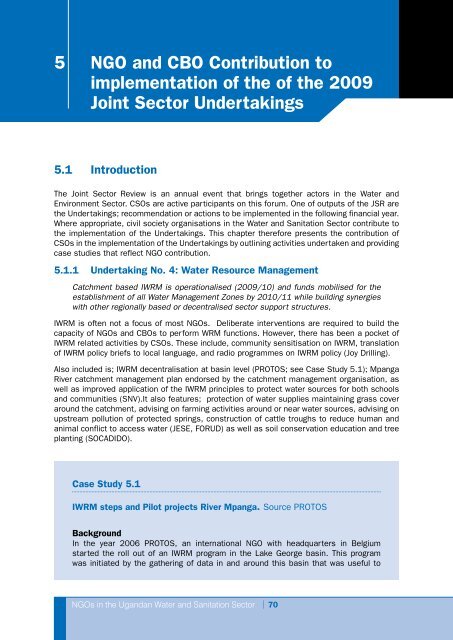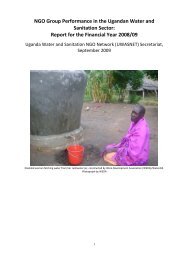Performance Report for FY 2009/10 - UWASNET
Performance Report for FY 2009/10 - UWASNET
Performance Report for FY 2009/10 - UWASNET
Create successful ePaper yourself
Turn your PDF publications into a flip-book with our unique Google optimized e-Paper software.
<strong>Per<strong>for</strong>mance</strong> <strong>Report</strong> <strong>for</strong> <strong>FY</strong> <strong>2009</strong>/<strong>10</strong><br />
5 NGO and CBO Contribution to<br />
implementation of the of the <strong>2009</strong><br />
Joint Sector Undertakings<br />
5.1 Introduction<br />
The Joint Sector Review is an annual event that brings together actors in the Water and<br />
Environment Sector. CSOs are active participants on this <strong>for</strong>um. One of outputs of the JSR are<br />
the Undertakings; recommendation or actions to be implemented in the following financial year.<br />
Where appropriate, civil society organisations in the Water and Sanitation Sector contribute to<br />
the implementation of the Undertakings. This chapter there<strong>for</strong>e presents the contribution of<br />
CSOs in the implementation of the Undertakings by outlining activities undertaken and providing<br />
case studies that reflect NGO contribution.<br />
5.1.1 Undertaking No. 4: Water Resource Management<br />
Catchment based IWRM is operationalised (<strong>2009</strong>/<strong>10</strong>) and funds mobilised <strong>for</strong> the<br />
establishment of all Water Management Zones by 20<strong>10</strong>/11 while building synergies<br />
with other regionally based or decentralised sector support structures.<br />
IWRM is often not a focus of most NGOs. Deliberate interventions are required to build the<br />
capacity of NGOs and CBOs to per<strong>for</strong>m WRM functions. However, there has been a pocket of<br />
IWRM related activities by CSOs. These include, community sensitisation on IWRM, translation<br />
of IWRM policy briefs to local language, and radio programmes on IWRM policy (Joy Drilling).<br />
Also included is; IWRM decentralisation at basin level (PROTOS; see Case Study 5.1); Mpanga<br />
River catchment management plan endorsed by the catchment management organisation, as<br />
well as improved application of the IWRM principles to protect water sources <strong>for</strong> both schools<br />
and communities (SNV).It also features; protection of water supplies maintaining grass cover<br />
around the catchment, advising on farming activities around or near water sources, advising on<br />
upstream pollution of protected springs, construction of cattle troughs to reduce human and<br />
animal conflict to access water (JESE, FORUD) as well as soil conservation education and tree<br />
planting (SOCADIDO).<br />
Case Study 5.1<br />
IWRM steps and Pilot projects River Mpanga. Source PROTOS<br />
Background<br />
In the year 2006 PROTOS, an international NGO with headquarters in Belgium<br />
started the roll out of an IWRM program in the Lake George basin. This program<br />
was initiated by the gathering of data in and around this basin that was useful to<br />
NGOs in the Ugandan Water and Sanitation Sector | 70



